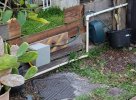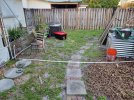- Joined
- Jul 16, 2014
- Messages
- 29,130
- Location (City and/or State)
- South Eastern Florida (U.S.A.)/Rock Hill S.C.
I use extension cords outside to provide electricity to areas where there is none available.
I start with the heaviest gauge wired cords I can find and place the junctions (plugs) in waterproof boxes. These outdoors cords hold up to Florida's harsh sunshine very well. They last at least 6 years each.
Care must be taken to not allow the cord to be anywhere that a curious tortoise won't be able to bite it. This cord operates a timer and just one 50 watt CHE inside that night box.
The second cord, I've enclosed inside some PVC pipe and buried it Underground. This cord powers two small pump motors that operate two large fish ponds.
I expect this cord to operate safely for a much longer period of time. I'm expecting 10 plus years.
I had a cord going overhead along a trellis before this. It wasn't ideal.
These heavy duty cords cost more money. But they handle the power and last so much longer that in the end, they justify the purchase.
There is just so much that needs attention in my yard and there are so few days that I'm able to perform any of it.
I start with the heaviest gauge wired cords I can find and place the junctions (plugs) in waterproof boxes. These outdoors cords hold up to Florida's harsh sunshine very well. They last at least 6 years each.
Care must be taken to not allow the cord to be anywhere that a curious tortoise won't be able to bite it. This cord operates a timer and just one 50 watt CHE inside that night box.
The second cord, I've enclosed inside some PVC pipe and buried it Underground. This cord powers two small pump motors that operate two large fish ponds.
I expect this cord to operate safely for a much longer period of time. I'm expecting 10 plus years.
I had a cord going overhead along a trellis before this. It wasn't ideal.
These heavy duty cords cost more money. But they handle the power and last so much longer that in the end, they justify the purchase.
There is just so much that needs attention in my yard and there are so few days that I'm able to perform any of it.
Attachments
Last edited:


